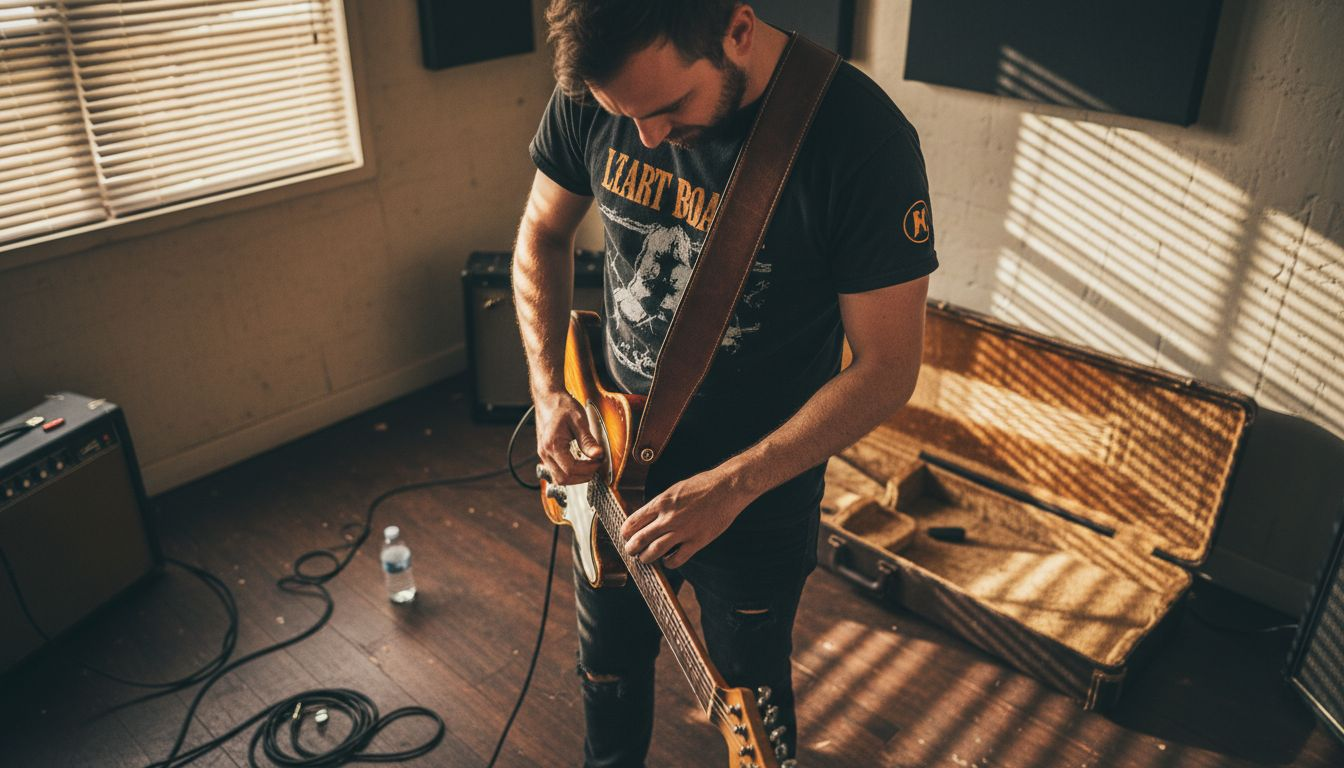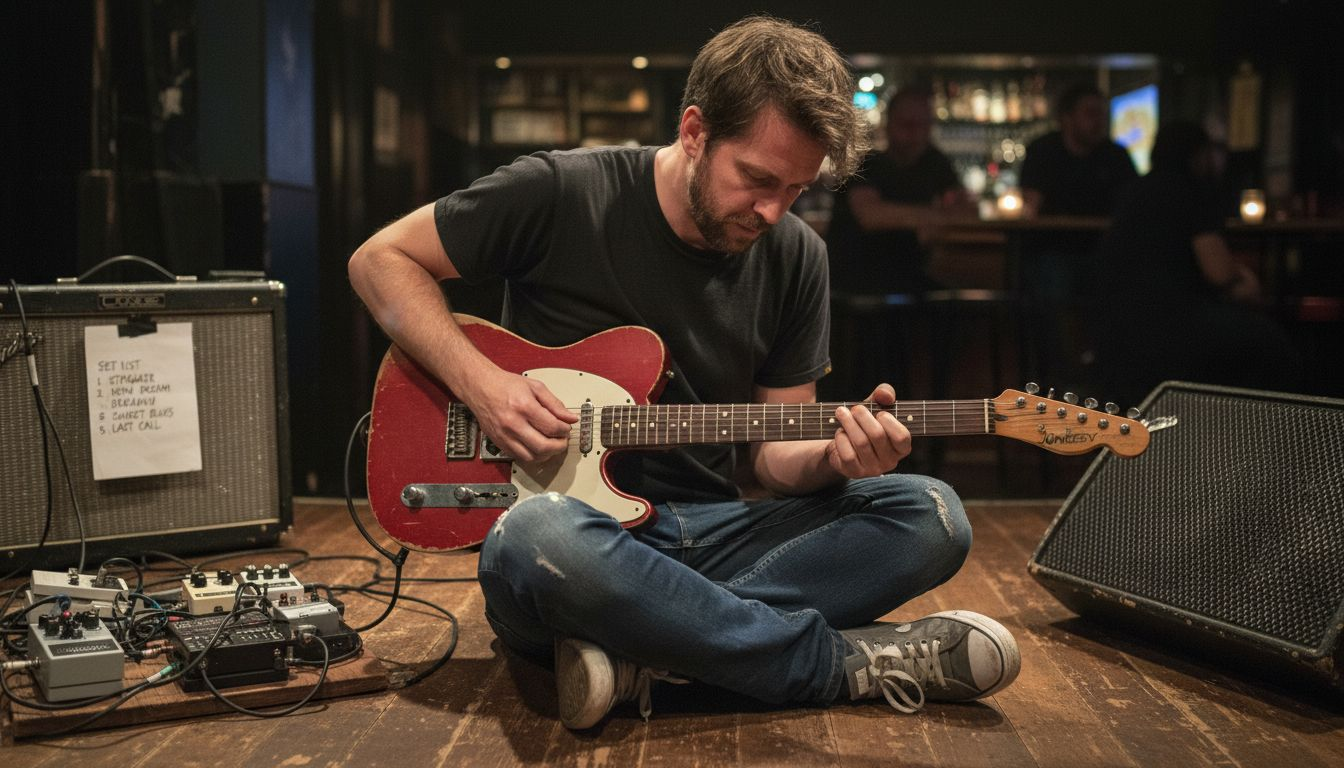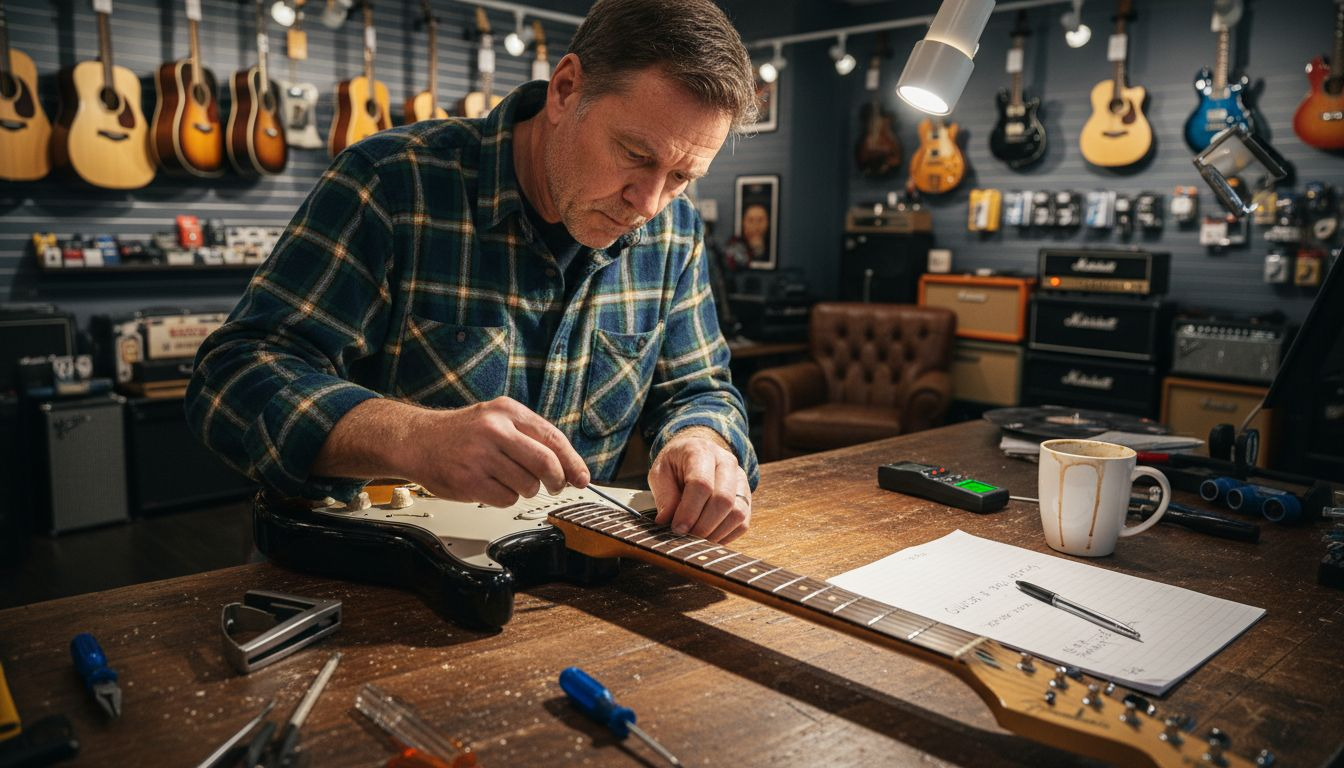Are you ready to take your guitar playing to the next level and truly master the instrument? Whether you're a beginner looking to build a solid foundation or an experienced player aiming to refine your skills, this blog is your guide to achieving musical proficiency on the guitar.
We’ll cover essential techniques, practical exercises, and effective strategies to help you progress on your journey, from building finger strength and dexterity to understanding music theory and developing your unique style. Dive in to find the inspiration, tools, and tips that will transform your guitar playing and fuel your passion for music!
Playing the guitar is a rewarding and fulfilling endeavor that allows individuals to express their creativity and connect with music on a deeper level. Whether you're a complete beginner or have been strumming for a while, the path to becoming proficient requires dedication, patience, and a systematic approach. In this blog, we will explore practical tips and strategies to help you progress and ultimately become an accomplished guitarist.
Techniques, Tips, and Strategies for Every Player to Mastering the Guitar
-
Start with the Basics:
Every guitarist's journey begins with building a solid foundation. Start by familiarizing yourself with the guitar's anatomy, learning how to hold it properly, and understanding the fundamental techniques such as proper finger placement, strumming, and picking. Dedicate time to practice these basics until they become second nature.
-
Set Clear Goals:
Setting clear and achievable goals is crucial for your growth as a guitarist. Identify what you want to accomplish, whether it's learning a particular song, mastering a specific technique, or playing in a band. Break down your goals into smaller milestones, allowing you to track your progress and maintain motivation along the way.
-
Establish a Practice Routine:
Consistency is key when it comes to improving your guitar skills. Establish a regular practice routine and stick to it. Set aside dedicated practice time each day or week, even if it's just for a short duration. Regular practice sessions will help you develop muscle memory, build finger strength, and improve overall dexterity.
-
Learn from Resources:
The internet offers a wealth of resources for aspiring guitarists. Explore online tutorials, video lessons, and interactive websites to learn chords, scales, and techniques. Take advantage of reputable websites, YouTube channels, and online forums that provide step-by-step guidance, tips, and tricks. Consider investing in a few quality instructional books or enrolling in online courses to receive structured guidance.
-
Play Along with Songs:
Playing along with your favorite songs is an enjoyable and effective way to improve your skills. Start with simpler tunes that match your skill level and gradually progress to more complex songs. Focus on mastering the rhythm, strumming patterns, and chord changes. As you become more proficient, experiment with adding your unique flair and improvisation to the songs.
-
Seek Guidance and Feedback:
Seeking guidance from an experienced guitar teacher or mentor can greatly accelerate your progress. They can provide personalized instruction, correct any bad habits, and offer valuable feedback. Additionally, consider attending workshops, music camps, or joining local music communities to interact with other guitarists, share experiences, and gain inspiration.
-
Embrace Music Theory:
While it may seem daunting at first, understanding music theory can significantly enhance your playing ability. Learn the basics of scales, keys, chord progressions, and how they relate to the guitar. This knowledge will enable you to improvise, write your own music, and comprehend the underlying structure of the songs you play.
-
Play with Others:
Collaborating with other musicians is an excellent way to develop your skills and gain invaluable experience. Join a band, participate in jam sessions, or attend open-mic nights to connect with fellow musicians. Playing alongside others will improve your ability to listen, adapt, and enhance your overall musicality.
-
Embrace Challenges:
Don't shy away from challenging yourself. Push beyond your comfort zone by attempting difficult songs, complex techniques, or unfamiliar genres. Embracing challenges fosters growth and expands your repertoire, allowing you to become a more versatile and well-rounded guitarist.
-
Stay Motivated and Enjoy the Journey:
Remember that learning to play the guitar is a lifelong journey. Stay motivated, maintain a positive mindset, and enjoy the process. Celebrate your achievements, no matter how small, and use setbacks as opportunities to learn and improve. Surround yourself with other good guitarists, hang out at musicstreet to meet like minded musicians and learn from them. get along to Jam sessions and play with people who are more proficient.
check out this article at Carrington guitar academy on mental health benefits of learning the guitar
Developing Finger Strength and Dexterity
Improving your finger strength and dexterity is crucial for mastering the guitar. Strong fingers make it easier to press down on the strings, execute smooth transitions between chords, and perform advanced techniques like bends and vibrato.
Finger Exercises for Guitarists
- Chromatic Exercises: Play each fret on each string in sequence using all four fingers. This exercise helps develop finger independence and strength.
- Spider Exercises: Move between different strings using a sequence that forces your fingers to stretch. This exercise improves both flexibility and coordination.
- Stretching and Warm-Up Routines: Regularly stretch your fingers before playing to prevent strain and injuries. Simple warm-up exercises prepare your hands and fingers for longer practice sessions.
Expanding Your Chord Vocabulary
Knowing a wide variety of chords will greatly enhance your ability to play different songs and styles. Beyond basic open chords, learning different types of chords is essential for becoming a versatile guitarist.
Types of Chords to Learn
- Barre Chords: Allows you to play chords up and down the neck using the same shapes. Barre chords are essential for playing in different keys and for more dynamic sound options.
- Power Chords: Commonly used in rock and punk music, power chords are two-note chords that provide a strong, simple foundation.
- Jazz Chords: For those interested in jazz, learning complex chords like major sevenths, minor sevenths, and diminished chords will add depth and color to your playing.
Mastering Guitar Techniques
Mastering various guitar techniques is crucial for enhancing your playing style and musical expression. These techniques add character and emotion to your performance.
Essential Guitar Techniques
- Hammer-Ons and Pull-Offs: Use these techniques to create smooth, flowing lines without constantly picking every note. Practice with scales and melodies to integrate them into your playing.
- Alternate Picking: Develop speed and precision by alternating between downstrokes and upstrokes. This technique is fundamental for playing faster passages and achieving a clean sound.
- Palm Muting: Place the side of your picking hand on the strings near the bridge to mute them, creating a chunky, percussive sound often used in rock and metal genres.
Understanding Different Playing Styles
To become a well-rounded guitarist, it’s essential to explore different playing styles. Each style brings unique elements that can expand your musical abilities and versatility.
Popular Guitar Styles
- Fingerstyle Guitar: Involves plucking the strings directly with your fingertips or nails, often used in folk, classical, and acoustic music.
- Slide Guitar: Uses a slide, usually made of glass or metal, to glide along the strings. This style is popular in blues and country music for its distinctive, smooth sound.
- Flamenco and Classical Guitar: Incorporates rapid fingerpicking and complex rhythmic patterns, requiring excellent finger independence and precision.
Incorporating Music Theory into Your Playing
While some guitarists rely solely on their ears, understanding music theory can unlock a deeper level of proficiency and creativity.
Key Areas of Music Theory
- Scales and Modes: Learn major and minor scales, as well as modes like Dorian and Mixolydian, to expand your soloing options and create diverse melodies.
- Chord Progressions: Understanding common chord progressions allows you to quickly learn new songs, write original music, and improvise with confidence.
- Intervals: Recognize the distances between notes to build chords, harmonize melodies, and enhance your overall understanding of music composition.
Overcoming Plateaus in Your Guitar Journey
Every guitarist encounters periods where progress seems to stall. Overcoming these plateaus is a critical part of mastering the guitar.
Tips for Breaking Through Plateaus
- Change Up Your Practice Routine: Try new exercises, learn different songs, or explore a new genre to keep things fresh and challenging.
- Focus on Weaknesses: Identify the areas where you struggle the most and dedicate extra practice time to them.
- Record Yourself Playing: Listening to recordings of your playing can help identify areas for improvement and track your progress over time.
Building Confidence Through Performance
Building confidence is key to mastering the guitar, and one of the best ways to achieve this is by performing regularly.
Ways to Gain Performance Experience
- Open Mic Nights: Great opportunities to get comfortable playing in front of an audience and receive constructive feedback.
- Jam Sessions: Playing with other musicians can improve your listening skills, timing, and adaptability.
- Home Performances: Start by playing for friends or family to build confidence in a familiar setting before moving on to larger audiences.
Conclusion
Mastering the guitar is a journey that requires dedication, patience, and a love for the craft. By embracing a well-rounded approach that includes regular practice, exploring different techniques, and understanding music theory, you'll steadily advance toward your musical goals. Remember, every step you take on this journey brings you closer to becoming the guitarist you've always wanted to be. Keep challenging yourself, stay motivated, and enjoy the process of continuous growth and discovery. Your path to musical proficiency is just beginning!
At MusicStreet, we're here to support your journey towards mastering the guitar with a wide range of high-quality instruments, accessories, and expert advice. Whether you’re a beginner or an experienced player, our team is dedicated to helping you find the right gear to suit your style and goals. Visit us today and take the next step toward musical proficiency with confidence!
Frequently Asked Questions
How can I improve my finger strength and flexibility for better guitar playing?
Regularly practice finger exercises like chromatic scales, spider exercises, and stretching routines. These exercises will help build strength, flexibility, and coordination, making it easier to move between chords and play for longer periods without strain.
What should I do if I feel stuck and my guitar playing isn't improving?
If you feel stuck, try changing your practice routine. Focus on different techniques, learn new songs, or explore a new genre. Recording yourself and reviewing the playback can also help you identify areas for improvement. Taking lessons or seeking feedback from other musicians can provide fresh insights.
Why do my guitar strings keep buzzing or sounding muted?
Buzzing strings can be caused by low action (the distance between strings and the fretboard) or uneven frets. Check your string height and make sure your guitar is properly set up. Regularly changing strings and keeping the fretboard clean can also prevent buzzing and maintain sound quality.
How often should I practice to see consistent progress on the guitar?
Consistency is key. Aim for daily practice sessions of at least 20-30 minutes. Short, focused practice is more effective than infrequent, longer sessions. Adjust the time based on your goals and schedule, but regularity is crucial for steady improvement.
What should I do if I find certain guitar techniques too difficult?
Break down difficult techniques into smaller, manageable parts. Slow down the tempo, and practice each component separately. Use a metronome to gradually increase speed as you become more comfortable. Remember, patience and consistent practice are essential for mastering challenging techniques.
How do I keep my guitar in good condition to ensure it sounds great?
Regularly clean your guitar, especially the strings and fretboard, to prevent dirt and oil buildup. Store it in a case when not in use to protect it from temperature changes and humidity. Schedule routine maintenance and string changes to keep it in optimal condition.
Why is my progress slower than I expected, even though I practice regularly?
Progress can be affected by many factors, including practice quality, technique, and physical limitations. Make sure you’re practicing efficiently, focus on your weaknesses, use a metronome, and set specific goals. If progress still seems slow, consider getting professional guidance or lessons to identify areas that need improvement.




Share:
Unleashing the Melodic Magic: PRS Guitars - The Epitome of Sonic Excellence
Electric Guitar and Amp Duos That Will Blow Your Mind